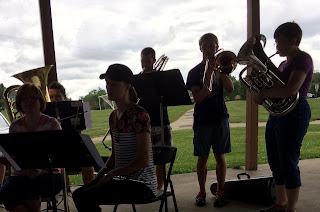I am writing this post in April of 2020. We've been home from everything for almost three weeks and we are a little crazy. One of the first things I realized when school closed was that we were still going to need to get out of the house every day or we weren't all going to survive, virus or no virus. We started going for walks. March is when the snow melts in Michigan and the freshly melted snow leaves behind six months worth of road side trash. It can be downright impressive. By the end of April nature has hidden it all away for another season but in March and early April it is there for all to see.
My husband likes to take long runs every day and as he runs he notices the trash. This spot is about a mile from our house and seams to be a hot spot for trash. So one day we put a couple of trash bags and gloves in our pockets and went for a walk. It took almost no time to fill two large trash bags and a very old cooler as full as we could carry them. One lady running by said Thank you. That was when we realized we hadn't worked out how we were going to get the trash back home. We made like the trash Santa and carried the bags toward home until we came upon a dumpster and decided it would be ethical to put the bags in it. (My apologies to the offices if it wasn't. But, really, how much easier could it be to help save the world than donating a little dumpster space?)
After that we started putting a couple of (smaller) trash bags in our pockets every time we left the house. The thing I have noticed most is that there is more trash than we can possibly pick up. It seams to collect near roads and parking lots and, oddly enough, around trash cans. The lady walking her dog was impressed: "Are you guys picking up trash?!? I always think I should, but I never do."
West Michigan is a little shy on sunshine. (I once had a doctor suggest that everyone living in West Michigan should take vitamin D supplements.) So whenever the sun shows it's cold little face we drag the kids out for a walk. We wear our coats, clean up trash, soak up whatever sun there is, get a little exercise, remember that there are other people in the world. (They are all out trying to stay sane, too. From six feet away, of course.)
It reminds me that I do, in fact, still belong to a community. And I can still contribute to that community, even from a six foot distance.
The skunk cabbage was in bloom. Did you know that skunk cabbage grows down into the ground instead of up into the air like most plants? An old skunk cabbage is almost impossible to dig up because its stem goes so far down into the mud. Crazy.






















